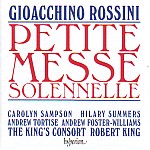This wonderful, witty (yes, “witty”) setting of the Mass has had some distinguished recordings, most of them, interestingly enough, from Germany. First there was the old Sawallisch with an all-star cast on RCA, then Marcus Creed with his splendid RIAS Chamber Choir and period instruments, and most recently Huber’s SWR production from Haenssler. This newcomer takes the “authentic” approach to sometimes excessive extremes, but nevertheless has a lot going for it. Robert King, like Sawallisch, uses only 12 singers, along with some nicely period-sounding pianos. His pacing is lively, and the choral contribution is just dandy.
Unfortunately as individuals the soloists are less impressive, though bass Andrew Foster-Williams is certainly good enough and soprano Carolyn Sampson is excellent by any standard, particularly in O salutaris hostia. Illness necessitated using a couple of tenors, and Andrew Tortise doesn’t sound terribly happy in Domine Deus, despite a delightfully honky-tonk (if a touch vulgar) piano accompaniment. Worst of all is alto Hillary Summers, one of those hollow-voiced English oratorio types who would be best off singing Gilbert and Sullivan. Her Agnus Dei is distinctly stiff and monotonous. Even so, most of the competition has at least one or two weak spots among the soloists (except perhaps Sawallisch, if you can still find it).
Finally, there’s that excessive extreme of “authenticity” just mentioned. King has decided to pronounce the Latin as it might have been done in Paris in the 1860s. He doesn’t go into how we know this, and frankly I don’t care. It results in all of the “u” sounds (phonetically “oo” as in “Deus”) being pronounced “i” as in “bit”. This is not just distracting; it’s more than a bit silly. After all, Latin pronunciation in Paris in the 1860s would have been perceived by listeners of the day simply as correct and unremarkable; to us it sounds wrong. Even worse, “i” is a very poor, asthmatic vowel sound for singing. The standard “oo” is much better, and this raises another issue: namely, even if Latin was pronounced that way, who’s to say that’s how it was sung? After all, French is pronounced quite differently from the way it’s sung and for good reason: the need to replace all of those nasal and swallowed vowels with nice, open ones that don’t get in the way of clean, clear vocal production.
I have no doubt that both Mr. Tortise and Ms. Summers would have been much happier singing their numbers with modern Latin pronunciation, and they would have sounded better too. Both Domine Deus and Agnus Dei obviously suffer from what King forces them to do. They are two of the biggest “u” numbers. So blame for the soloist’s vocal suffering must be laid at least partially at King’s door. I’ve dwelt on this at length because it seems such a pity that what might have been a very good performance is compromised by a pointlessly dogmatic, distinctly unmusical decision about an issue that’s otherwise totally irrelevant to our experience of the work.
































